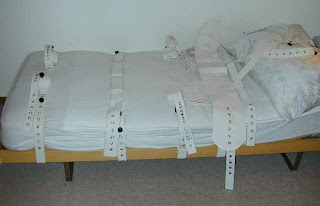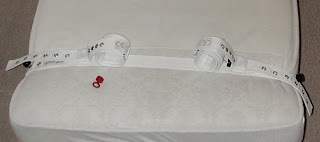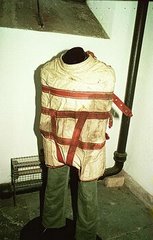24 juin 2007
9 mars 2007
1 mars 2007
"This firm shows great restraint"

Charles Sommer wears one of his firm's $90 straightjackets.
"About the same price as a sport coat from Penny's," he says.
By Anthony DeBartolo
MADISON, Wis. (Hyde Park Media) - Charles Sommer is an affable soul. He loves his family, his dog Rusty, the Beach Boys and grilling brats for his employees on the parking lot Weber twice a month.
Sitting in the walnut-paneled Esquire Club, a few hundred feet down the road from his office, 40-year-old Sommer nursed a cocktail while waiting for lunch. If it weren`t for another love, purple Hawaiian shirts, he`d look like every other executive in the place waiting for the daily special.
But Sommer is different. He`s in a manufacturing and marketing business that is, at best, unusual.
Sommer`s game is restraints, which is to say that straitjackets are the most familiar of his products, but he makes wrist and ankle restraints, too. Understandably, he tends to be wary of strangers asking questions, especially a stranger who has driven 146 miles to do so.
``So, you`re from Chicago?`` he said. ``I was there in the fall. Stayed at the Palmer House. Ordered a pizza. Nice town.``
Three cocktails and a turkey club later, Sommer lightened up.
``We are a little defensive about our product,`` he allowed. ``It`s not nice tying up people. But sometimes you`ve got to prevent them from hurting themselves or others. That`s why we call our company the Humane Restraint Co. It`s a lot more humane using soft leather than chains.``
Soft leather describes the majority of products in Humane Restraint`s 10-page illustrated price list: the wrist and ankle retraints, or preventive aggression devices, PADS, as they`re known in the trade.
Although the PADS line owes its existence to an 1876 patented invention of Sommer`s great-grandfather, Matthew W. Lynch, the firm`s founder, straitjackets ``have been around for centuries,`` Sommer said. ``I`ll bet the Romans had them. Maybe not. They crucified people. Why the hell would they tie them up?"
A harnessmaker by trade, Matthew Lynch was asked by the local insane asylum (as mental hospitals were then known; now it`s the Mendota Mental Health Institute) to fashion a safe but secure human restraint that no manner of thrashing about could foil. ``So he came up with this special lock buckle that we still use today,`` Sommer explained.
Those untouched by this low-tech advance in mental health care may need to be reminded of that time when such public institutions were commonly called snake pits and their inmate patients, for ease of maintenance, were often secured to walls and beds by ropes and chains.
Honorably displayed on Sommer`s office wall are two turn-of-the-century testimonials lauding the harnessmaker`s invention: awards from the World`s Columbian Exposition in Chicago in 1893. The first was ``for humane construction and great value in the care of the insane and delirious,`` the second ``for good workmanship and security; practical adaptability to uses for which they are intended.``
Awards notwithstanding, ``we do get some weird crank calls,`` said Sommer. ``We had a woman call for two weeks and sing to us. Some Western song, I think. `Don`t Fence Me In,` maybe.``
With his father, David, as company president since 1955, the younger Sommer grew up working the family trade. But after getting his business degree from the University of Wisconsin in 1970, he switched to the liquor store business, he recounted. Eleven years later he returned as marketing manager for the family firm.
``I like it here. It`s kind of boring, but it`s honest.
``
Humane Restraint`s bustling 3,000-square-foot work- shop/warehouse is staffed five days a week by a dozen employees, who laboriously hand-craft every item.
Sommer insists that his exact sales figures remain confidential. Still, six years ago a local newspaper reported he did ``about $450,000 worth of business a year.`` Today Sommer hints of a higher figure, ``less than $1 million a year.`` Unlike the competition, the Superior Surgical Manufacturing Co. in New York and the J.T. Posey Co. in California, Sommer`s PADS are not a sideline; they`re his main line. ``They don`t make as many varieties of restraints as we do, and they don`t make them as well,`` he said of his rivals. ``But they do make them cheaper.``
As a result, increasingly strapped public institutions whose business once went to the Humane Restraint Co. have gone ``generic,`` as Sommer put it. ``Cook County Jail used to be a big customer of ours,`` he said, then pointed to a newspaper photo of John Wayne Gacy modeling a set of PADS. ``But we haven`t sold them any since 1970. They`re buying the cheaper ones now.``
Sommer`s PADS run $15 each for the cotton variety, used for geriatric patients, to $144 for the top-of-the-line model: thick russet cowhide, foam-padded and lined with supple orthopedic leather. The dense white-canvas straitjackets are $90 apiece, ``about the same price as a sport coat from Penney`s,`` Sommer said.
As for his market, Sommer estimated it`s ``60 percent hospitals, 30 percent prisons and 10 percent other, like ambulance companies and magicians.``
``Every now and then we get the bondage people,`` he added. ``They`re C.O.D.``
How does he know they`re bondage people?
``The name S&M Institute - what`s that mean to you? But we don`t get that many. Maybe four orders a year.``
What about the magicians?
``They`re C.O.D., too. We`ve been burned by magicians. They`re bad credit risks. They disappear.``
Nonetheless, magicians are not to be locked out. Of the 350 to 400 straitjackets the firm sells each year, 50 to 60 go to escape artists.
``Sometimes they order them with bigger arm holes,`` so they can wiggle out of the sleeves, he revealed. ``But they usually buy our standard jacket and modify it themselves so they can get out.
``If we don`t know what size to send, we send a medium. That will fit just about anybody unless they have real long arms. It wouldn`t fit Dr. J.``
Sommer tells of one magician who had some difficulty with the standard jacket: Harry Houdini. ``I don`t know if it`s a legend or what, but the story is he came to town and challenged anyone to tie him up.`` While the distinguished escape artist wowed local farmers on the steps of the state capital, ``my great-grand father showed up with a straitjacket. He didn`t get out.
``
Others have.
``Every year we go to three trade shows,`` the National Sheriffs` Association, for example. ``We usually run into a sheriff who says some guy tore the hell out of our jacket in less than 20 minutes. The typical story is some prisoner, high on angel dust, gets endowed with super strength and just tears it up. It doesn`t happen often, maybe once a year. But it happens.``
California, due to sheer size, is the company`s chief customer, ``a full one-sixth of our business,`` Sommer said. ``They got lots of nuts out there.`` But ``Texas doesn`t buy much at all. I don`t know why that is. It`s a pretty big state, too."
He said that over the years, per capita, Louisiana buys more restraints than any other state.
``Florida is also a good market,`` he said. ``There`s a lot of prison hospitals in Florida, and a lot of old people. They buy our geriatric-type restraint. I don`t know why it`s not popular in Arizona. There`s a lot of old people there, too.``
As for the international market, ``a few Canadian orders, occasionally Europe,`` is about it. ``We don`t really export a lot. There must be someone in Europe making these things.
``We do get a number of inquiries from African countries. We send them a price sheet and never hear from them again.``
Magicians, sexual deviants and an occasional zoo aside, what`s the strangest order Sommer has ever received?
``I told you,`` he asserted, ``this isn`t a very humorous business. It`s boring.``
But then, affable fellow that he is, Sommer takes pause and ponders.
``How about the Quaker Oats Co.? The one in Chicago?`` he said. ``We sold them a straitjacket a few years ago.
``We speculated that Capt. Crunch went bonkers.``
This article first appeared in
the Chicago Tribune on
June 28, 1988.
© 1988 Hyde Park Media
Read More Hyde Park Media Articles
Sponsored Links
Hyde Park Media's special interest health book, Lupus Underground, is available online from Amazon (US, UK, Canada, France, Germany, Japan) as well as Powell's, Barnes & Noble, AbeBooks, BooksAMillion, Blackwell's, Pickabook and other fine retailers.
19 février 2007
CMRP.org
Centrale d' achat des maison de retraites privée :
http://www.cmrp.org/index.php?act=3,1,1,2
Inscription à :
Articles (Atom)






































